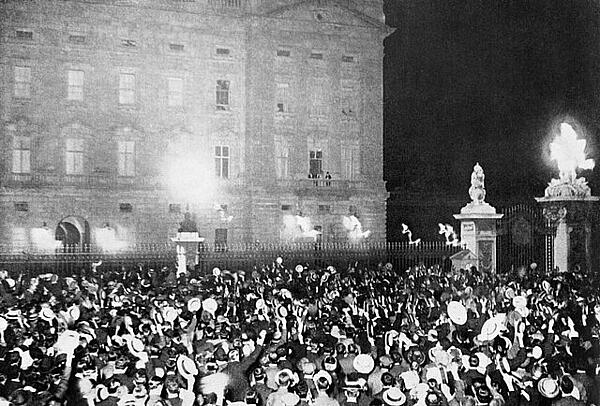The British Declaration of War
Great Britain officially declared war on Germant on 4 August 1914 in an announcement made by Prime Minister Herbert Asquith at 11pm. It was this announcement than marked the start of World War One, a war that had had been prompted by Germany's refusal to withdraw their forces from Belgium.
Germany's presence in Belgium was part of the Schlieffen Plan, which took effect in response to the assassination at Sarajevo. Despite the fact that Belgium was neutral - this ahd been guaranteed by Britain in 1839 - the Schlieffen Plan relied on the country's invasion and as such Asquith was faced with a challenging decision: ignore the problems unfolding in Europe or stand up against Germany.
Winston Churchill - First Lord of the Admiralty at this point in his career - described the scene in London in the hours leading to the declaration:
“It was 11 o’clock at night – 12 by German time – when the ultimatum expired. The windows of the Admiralty were thrown wide open in the warm night air. Under the roof from which Nelson had received his orders were gathered a small group of admirals and captains and a cluster of clerks, pencils in hand, waiting. Along the Mall from the direction of the Palace the sound of an immense concourse singing ‘God save the King’ flouted in. On this deep wave there broke the chimes of Big Ben; and, as the first stroke of the hour boomed out, a rustle of movement swept across the room. The war telegram, which meant, “Commence hostilities against Germany”, was flashed to the ships and establishments under the White Ensign all over the world. I walked across the Horse Guards Parade to the Cabinet room and reported to the Prime Minister and the Ministers who were assembled there that the deed was done.” - Winston Churchill

Churchill's comments suggest that war was not unexpected in Europe, but historians argue that records hint to the contrary. Other sources, including Kaiser Wilhelm II, seemed to show genuine remorse as the neighbouring countries began to squabble and it became clear that Germany would invade France.
“With heavy heart I have been compelled to mobilise my army against a neighbour at whose side it has fought on many a battlefield. With genuine sorrow do I witness the end of a friendship, which Germany loyally cherished. We draw the sword with a clean conscience and clean hands.”
This view seemed to be mirrored by that of Chancellor Bethmann Hollweg in his address to the Reichstag on the day Britain declared war, in which he stated openly that Germany's invasion of Belgium was wrong and should be "made good" as soon as the German military had achieved their goals.
However, as Churchill had predicted, the views of the Chancellor were not reflected in those of the German public, who seemed to openly enthuse about the prospect of war. Many even suggested that Bethmann himself was secretly keen to engage in war with his fellow Europeans, arguing that he had referred to the Treaty between Britain and Belgium as a "scrap of paper". However, there is some dispute as to whether this was a literal translation, particularly as it contrasts significantly with his speech to the Reichstag.
Back in Britain, Asquith had explained to the government that he had received a telegram from the German Ambassador who, in turn, had received a telegram from the German Foreign Secretary. According to the news, officials in Berlin wanted to make it clear that they had encouraged their forces to go through Belgium to avoid France, having received "absolutely unimpeachable information: that the French were planning an attack on Germant via Belgium. However, Asquith stated that this should not be regarded by Britain as "a satisfactory communication".
“We have, in reply to it [the telegram], repeated the request we made last week to the German Government that they should give us the same assurance with regard to Belgian neutrality as was given to us and to Belgium by France last week. We have asked that a reply to that request and a satisfactory answer to the telegram of this morning, should be given before midnight.”
However, upon receiving no such thing, the Foreign Office released the following statement:
"Owing to the summary rejection by the German Government of the request made by His Majesty's Government for assurances that the neutrality of Belgium would be respected, His Majesty’s Ambassador in Berlin has received his passport, and His Majesty’s Government has declared to the German Government that a state of war exists between Great Britain and Germany as from 11pm on 4 August.”
The British declaration of war was greeted with optimism by the public, who hoped that World War One would be over by Christmas 1914 following a swift victory.
MLA Citation/Reference
"The British Declaration of War". HistoryLearning.com. 2026. Web.
